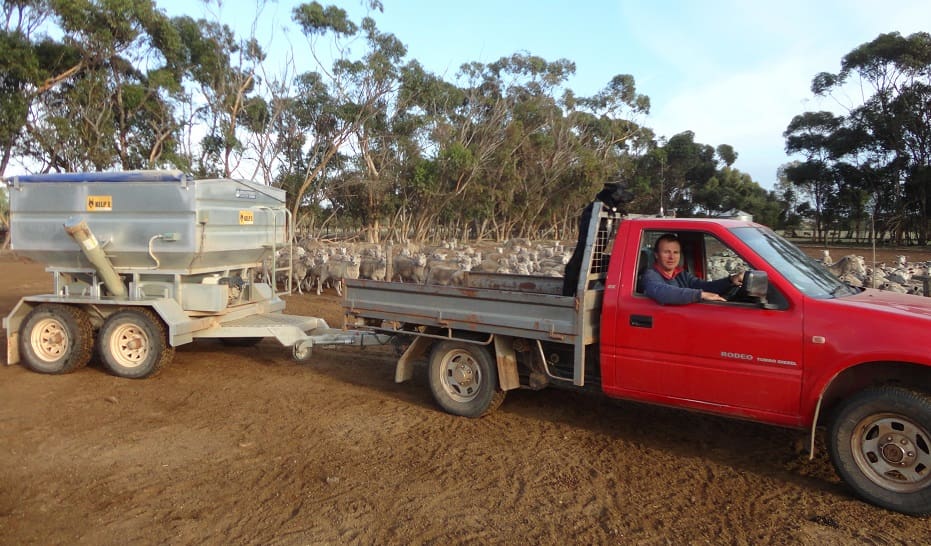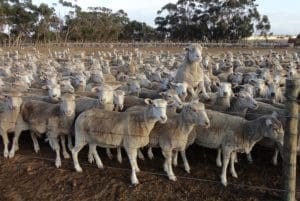
Glenthompson farmer Russell Mitchell ready to feed sheep in his containment areas
STOCK containment areas have many uses apart from paddock protection, drought feeding and deferring paddock grazing after a dry period, according to Glenthompson farmer Russell Mitchell.
Mr Mitchell will host an Agriculture Victoria stock containment field day and workshop on his Glenelg Highway property on 18 February.
It will be held on-farm at 4686 Glenelg Highway, Glenthompson on from 9.30am-1pm. Contact Nerissa Lovric on 0475 986 314 or [email protected] or click here to register online.
Mr Mitchell has the ability to maintain about 2200 grown sheep in small containment areas across his farm and has mainly used them for drought feeding of sheep. But he said the areas are handy during shearing time, and for isolating recent ram purchases or other sheep from main mobs. He believes every sheep farm could benefit from a livestock containment area.
“If I had realised the uses and benefits of stock containment areas, I would have had one years ago,” he said.
Agriculture Victoria said a stock containment area (SCA) is a carefully selected part of the property which is set up to temporarily hold, feed and water livestock during dry seasonal conditions or following a fire.
While primarily used to protect soil and pasture during adverse conditions, the benefits of the areas are numerous. Mr Mitchell will discuss these benefits as part of a stock containment area at the workshop.
He said a key benefit was that pasture paddocks can be locked up, giving plants the opportunity to recover and ensuring lambing ewes can then be put onto sufficient pasture following the autumn break.
“Stock containment areas are a really good management tool.
“I am saving time by not having to feed out in different paddocks over summer and it’s much easier to monitor stock when conditions are not optimal,” Mr Mitchell said.
Removing stock from paddocks and feeding temporarily in containment, has many other potential benefits, including:
- Reduced animal energy requirements, due to the reduced need to forage for food
- Potential to maximise animals’ production with close monitoring of animal health and welfare and meeting requirements such as feed and optimum water quality
- Efficient use of on-farm labour and feeding resources, due to stock being close to feed and water supplies
- Reduced soil erosion in farm paddocks when stock are removed (due to less stock movement and overgrazing)
- Increasing pasture persistence in paddocks, due to not overgrazing dormant pastures over the summer
- The ability to develop a ‘feed wedge’ while stock are in containment.
Workshop will cover containment area risks

Crossbred ewes in a Mitchell containment area.
During the workshop participants will also hear about what to consider when establishing a SCA, such as environmental or amenity risks, and how to maximise animal welfare and production efficiencies.
The event will also cover:
- Choosing a SCA site and design
- How to design a reliable and adequate water supply system to deal with peak demand times
- The benefits and uses of SCA’s including autumn savings, drought feeding, weaning, biosecurity and quarantine management
- Feeding and nutrition of sheep in containment, including the addition of adequate fibre to the diet.
This field day is being delivered as part of Glenelg Hopkins Catchment Management Authorities ‘Our Catchments Our Communities’ project, funded by the Victorian Government.
The Victorian Government has committed funding of $222 million over four years to ensure Victoria’s waterways and catchments support environmental, social, cultural and economic needs and the values of our communities.
For more information about managing livestock during drought and dry seasonal conditions, and case studies on SCAs, visit agriculture.vic.gov.au/dryseasons.

HAVE YOUR SAY